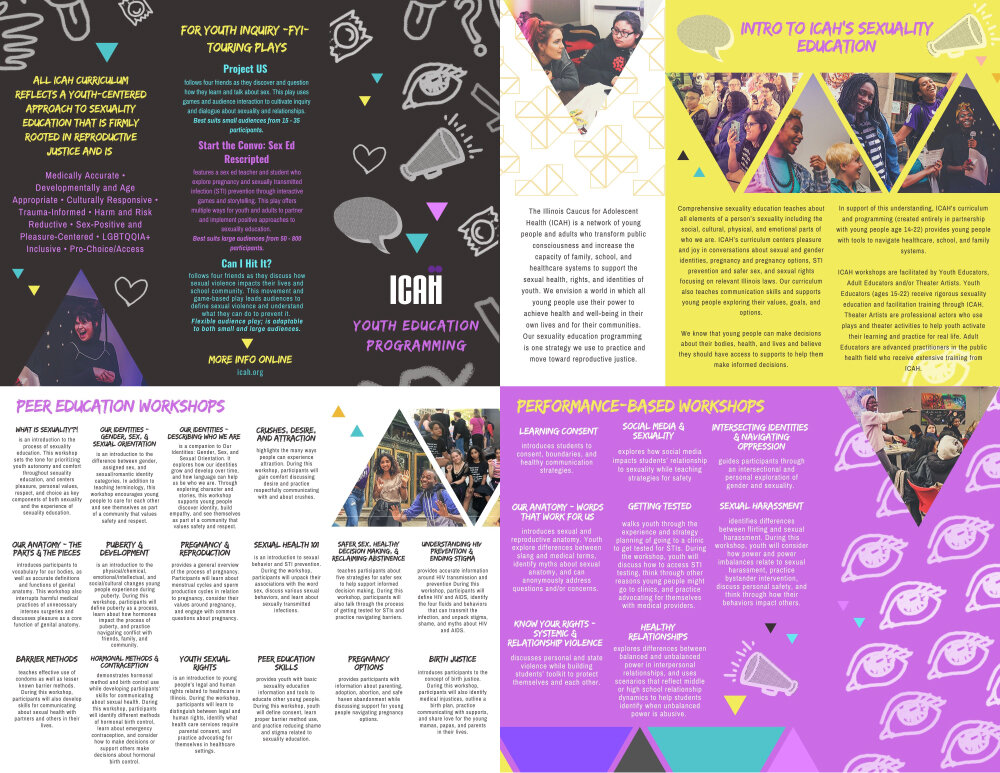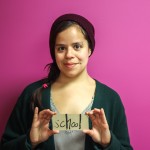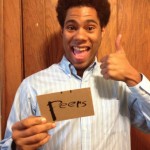




Youth Programs
Youth Education
Youth Programs
Youth Education
Supporting the health, rights, and identities of youth...
Sexuality is not only physical, but also chemical, emotional, intellectual, social, and cultural. Young people in Illinois have the right to sexuality education that reflects their needs and questions about all these dimensions of sexuality. For this reason, ICAH offers sexuality education in multiple styles that meet the National Sexuality Education Standards.
ICAH youth workshops are facilitated by CHAT Educators, Adult Educators, and/or Theater Artists. CHAT Educators (ages 16-22) receive rigorous sexuality education and facilitation training through ICAH (see CHAT). Theater Artists are professional actors who use plays and theater activities to help youth activate their learning and practice for real life (see FYI). Adult Educators are advanced practitioners in the public health field who receive extensive training from ICAH.
Peer Education Workshops are co-facilitated by a CHAT Educator and an Adult Educator. Our Performance-based Programming offers participatory plays, which open the door to safe and engaging conversations, and workshops co-facilitated by an Adult Educator and a Theater Artist.
ICAH’s Sexuality Education aligns with our mission, vision, reproductive justice framework, and youth development framework. Our information reflects an approach to sexuality education that is medically accurate, developmentally- and age-appropriate, culturally sensitive, trauma-informed, and inclusive of youth of all sexual orientations and gender identities. Discounts for 6, 8 and 10-week residencies are available. Sliding scale rates are available to underfunded and unfunded groups and organizations.
We can work together to envision how ICAH programming can best support your young people’s needs. Each subject listed in the menu below can be explored through content education via peer workshops, emotional education via performance-based workshops, or through residencies that combine the two.
Please scroll down to see our full menu of topics. To request ICAH programming for your organization or to have programs tailored to your needs, email ICAH or call 312-427-4460.
+ What is peer education?
Peer education workshops are led by CHAT youth who complete ICAH’s sexuality education professional development program. ICAH staff and youth leaders work collaboratively, offering interactive modules that are medically accurate, age-appropriate, and youth-friendly. Peer educators are supported by an adult educator during all workshops.
+ What is performance-based education?
Rooted in the characters and stories of our plays, all performance-based curriculum is facilitated by an Adult Educator and Theater Artist. Workshops and residencies use participatory theatre tools to cultivate inquiry and provide students with opportunities to practice applying sexual health education content to their own lives.
+ What is a residency?
ICAH Adult Educators, CHAT educators and performers train young people to think creatively and critically about their sexual health. Residencies begin with a performance of one of our participatory plays, and over the course of the next seven to nine sessions, engage students through participatory theatre tools to cultivate inquiry and apply the sexuality education content learned to their lives.
+ What's in ICAH's secret sauce?
All our youth education programs feature:
- Active inquiry about sustainable change and dialogue that investigates sexual health through a reproductive justice framework.
- Diversity in our storytelling that honors a range of experiences across race, class, gender, ability, sexuality, and other identity lines.
- Youth voice, youth leadership, and creative engagement between youth and their communities so that young people feel comfortable asking questions.
- Challenges to assumptions, common language, and shame.
+ What are ICAH’s approaches to comprehensive sexuality education?
All ICAH Curriculum reflects a youth-centered approach to sexuality education that is firmly rooted in reproductive justice and:
- Medically Accurate
- Developmentally and Age Appropriate
- Culturally Responsive
- Trauma-Informed
- Harm and Risk Reductive
- Sex-Positive and Pleasure-Centered
- LGBTQIA+ Inclusive
- Pro-Choice/Access
Program Menu
*indicates performance-based workshop
†indicates peer education workshop
please click the category headings below to explore
For Youth Inquiry (FYI) Touring Plays
Project US follows four friends as they discover and question how they learn and talk about sex. This play uses games and audience interaction to cultivate inquiry and dialogue about sexuality and relationships. Best suits small audiences from 15 - 35 participants.
Start the Convo: Sex Ed Rescripted features a sex ed teacher and student who explore pregnancy and sexually transmitted infection (STI) prevention through interactive games and storytelling. This play offers multiple ways for youth and adults to partner and implement positive approaches to sexuality education. Best suits large audiences from 50 - 800 participants.
Can I Hit It? follows four friends as they discuss how sexual violence impacts their lives and school community. This movement and game-based play leads audiences to define sexual violence and understand what they can do to prevent it. Flexible audience play; is adaptable to both small and large audiences.
Project US follows four friends as they discover and question how they learn and talk about sex. Download an excerpt of the script here.
Can I Hit It? follows four friends as they discuss how sexual violence impacts their lives and school community. Download an excerpt of the script here.

Meet the Characters
Meet the Characters
Meet the Characters
Project US
cady
A 16-year old lesbian raised Catholic, Cady finds conflict between the religious views she was brought up in and her personal views about sexuality.
Matt
Matt struggles to talk about sex with his girlfriend and turns to the audience for advice. A Chicago high school student, Matt is bombarded by outside messages about sex and must sift through the confusion to start his first successful conversation with Audre.
Audre
A survivor of shame and fear-based sexuality education in her high school, Audre can’t shake terrifying images of STIs from her brain when she thinks about sex. She works to start an honest and accessible conversation that won’t give her nightmares later on.
Elijah
Elijah has more sex than many of his peers, but still can’t talk about it. Midway through his story, he recognizes the importance of open dialogue and explores how to have better conversations in his own relationship.
Can I Hit It?
Maya
Maya’s story centers on her coming to terms with the idea that sexual violence has played a part in her life and relationship. By asking the audience for help confronting her boyfriend, Maya shifts from quiet discomfort in to being empowered to take action.
Danny
An aspiring young screenwriter, Danny struggles to write a non-clichéd love scene in his new romantic comedy. He works with the audience to understand the disconnect between movie romance and real life, especially as it relates to his own queerness.
Keri
As Keri tries to understand how to best support sexual violence survivors around her (like Maya), she begins to understand the role it plays in her personal life.
Shawn
Shawn tries to be a good boyfriend, but has trouble seeing the ways in which his girlfriend’s possessive behavior is unhealthy — for both of them. Technology, especially cell phones, has a huge impact on his relationship.

Peer Education Workshops
Peer Education Workshops
PEER EDUCATION WORKSHOPS
What is Sexuality?!
This workshop is an introduction to the process of sexuality education. This workshop sets the tone for prioritizing youth autonomy and comfort throughout sexuality education, and centers pleasure, personal values, respect, and choice as key components of both sexuality and the experience of sexuality education.
Learning Objectives:
- Describe sexuality and consider how it applies to people’s lives
- Develop group guidelines to support each other
- Cultivate comfort in discussing sexuality
- Express empathy for fear or anxiety of starting sexuality education
- Create questions to further learning
Our Identities: Gender, Sex, and Sexual Orientation
This workshop is an introduction to the difference between gender, assigned sex, and sexual/romantic identity categories. In addition to teaching terminology, this workshop encourages young people to care for each other and see themselves as part of a community that values safety and respect.
Learning Objectives:
- Describe sexuality and consider how it applies to people’s lives
- Recognize the presence and impact of binaries on daily life
- Define terminology related to gender, assigned sex, and sexual/romantic identity
- Practice celebrating and respecting all gender and sexual identities
Our Identities: Describing Who We Are
This workshop is a companion to Our Identities: Gender, Sex, and Sexual Orientation. It explores how our identities grow and develop over time, and how language can help us be who we are. Through exploring character and stories, this workshop supports young people discover identity, build empathy, and see themselves as part of a community that values safety and respect.
Learning Objectives:
- Explain how each character’s experience of identity changed over time
- Differentiate between gender and sexual identity
- Identify assumptions about gender and sexual identity
- Practice celebrating and respecting all gender and sexual identities
Crushes, Desire, and Attraction
This workshop highlights the many ways people can experience attraction. During this workshop, participants will gain comfort discussing desire and practice respectfully communicating with and about crushes.
Learning Objectives:
- Recognize attraction as a complex, unique experience
- Identify and analyze how media scripts impact ideas about attraction
- Practice communicating with crushes and with friends about crushes
- Demonstrate care in communicating about attraction
Our Anatomy: The Parts + The Pieces
This workshop introduces participants to vocabulary for our bodies, as well as accurate definitions and functions of genital anatomy. This workshop also interrupts harmful medical practices of unnecessary intersex surgeries and discusses pleasure as a core function of genital anatomy.
Learning Objectives:
- Understand functions of genital anatomy
- Recognize similarities and differences between genital functions
- Define intersex and understand intersex variation as healthy
- Practice asking questions about genital anatomy
Puberty and Development
This workshop is an introduction to the physical/chemical, emotional/intellectual, and social/cultural changes young people experience during puberty. During this workshop, participants will define puberty as a process, learn about how hormones impact the process of puberty, and practice navigating conflict with friends, family, and community.
Learning Objectives:
- Define puberty as a process
- Describe common physical and chemical changes that may occur during puberty
- Respond to challenging situations that may occur during puberty
- Practice incorporating healing techniques to reduce stress
Pregnancy and Reproduction
This workshop provides a general overview of the process of pregnancy. Participants will learn about menstrual cycles and sperm production cycles in relation to pregnancy, consider their values around pregnancy, and engage with common questions about pregnancy.
Learning Objectives:
- Describe menstrual cycles, sperm production cycles, and fertility
- Understand the scientific process of pregnancy
- Recognize that shaming messages about young people’s experiences with pregnancy are harmful and unnecessary
- Answer common questions related to pregnancy
Sexual Health 101
This workshop is an introduction to sexual behavior and STI prevention. During the workshop, participants will unpack their associations with the word sex, discuss various sexual behaviors, and learn about sexually transmitted infections.
Learning Objectives:
- Analyze risk of various sexual behaviors
- Explain consent and how it relates to sexual health
- Identify common STIs and how they are transmitted
- Name safer sex practices
Safer Sex, Healthy Decision Making, and Reclaiming Abstinence
This workshop teaches participants about five strategies for safer sex to help support informed decision making. During this workshop, participants will also talk through the process of getting tested for STIs and practice navigating barriers.
Learning Objectives:
- Identify safer sex as a critical component of sexual health
- Discuss education, barrier method use, STI testing, communication, and abstinence as key components to practicing safter sex
- Describe steps to getting tested for STIs at a clinic
- Name and challenge barriers to getting tested for STIs
Understanding HIV: Prevention and Ending Stigma
This workshop provides accurate information around HIV transmission and prevention During this workshop, participants will define HIV and AIDS, identify the four fluids and behaviors that can transmit the infection, and unpack stigma, shame, and myths about HIV and AIDS.
Learning Objectives:
- Define and differentiate between HIV and AIDS
- Describe stigma and how it perpetuates myths about HIV
- Identify how to prevent HIV transmission
Barrier Methods
This workshop teaches effective use of condoms as well as lesser known barrier methods. During this workshop, participants will also develop skills for communicating about sexual health with partners and others in their lives.
Learning Objectives:
- Explain how and why barrier methods are used
- Demonstrate how to effectively use barrier methods including external and internal condoms, dental dams, and gloves
- Practice effectively using barrier methods
- Identify people to continue talking to about sexual health
Hormonal Methods + Contraception
This workshop demonstrates hormonal method and birth control use while developing participants’ skills for communicating about sexual health. During this workshop, participants will identify different methods of hormonal birth control, learn about emergency contraception, and consider how to make decisions or support others make decisions about hormonal birth control.
Learning Objectives:
- Describe hormonal contraception and how it works
- Identify different methods of hormonal contraception
- Advocate for themselves and support others in decisions about hormonal birth control
Youth Sexual Rights
This workshop is an introduction to young people’s legal and human rights related to healthcare in Illinois. During the workshop, participants will learn to distinguish between legal and human rights, identify what health care services require parental consent, and practice advocating for themselves in healthcare settings.
Learning Objectives:
- Distinguish between legal rights and human rights
- Think through accessibility as it relates to healthcare
- Consider risk, support, and personal comfort around accessing healthcare
- Practice advocating for themselves and others in a healthcare setting
Peer Education Skills
This workshop provides youth with basic sexuality education information and tools to educate other young people. During this workshop, youth will define consent, learn proper barrier method use, and practice reducing shame and stigma related to sexuality education.
Learning Objectives:
- Define consent and safer sex
- Identify qualities of a positive sexual health educator
- Practice teaching sexual health information to peers
Pregnancy Options
This workshop provides participants with information about parenting, adoption, abortion, and safe haven abandonment while discussing support for young people navigating pregnancy options.
Learning Objectives:
- Describe parenting, adoption, abortion, and safe haven abandonment
- Recognize a pregnant young person’s right to make their own decision about pregnancy
- Practice shame-free support for young people making decisions about pregnancy
Birth Justice
This workshop introduces participants to the concept of birth justice. During this workshop, participants will also identify medical injustices, outline a birth plan, practice communicating with supports, and share love for the young mamas, papas, and parents in their lives.
Learning Objectives:
- Define birth justice
- Discuss supports during pregnancy and the birth process
- Practice developing and explaining a birth plan
- Center positive messages about young people who are pregnant and parenting

Performance-Based Workshops
Performance-Based Workshops
PEER EDUCATION WORKSHOPS
Learning Consent
This workshop introduces students to consent, boundaries, and healthy communication strategies.
Learning Objectives:
- Identify and articulate the importance of clear, ongoing consent
- Discuss social scenarios where one might need to ask for consent, and practice responding
- Articulate the importance of boundaries, both emotional and physical, and discuss how they apply to relationships
- Discuss different social scenarios in which one’s boundaries might change
Know Your Rights: Systemic & Relationship Violence
This workshop discusses personal and state violence while building students’ toolkit to protect themselves and each other.
Learning Objectives:
- Distinguish between legal rights and human rights
- Identify supportive strategies to respond to someone who has experienced sexual harm or violence
- Discuss the rights and services young people have access to across school, family, and healthcare systems
- Practice shame-free support for young people navigating experiences with sexual violence
Healthy Relationships
This workshop explores differences between balanced and unbalanced power in interpersonal relationships, and uses scenarios that reflect middle or high school relationship dynamics to help students identify when unbalanced power is abusive.
Learning Objectives:
- Describe what power in relationships looks like and how it can impact healthy dynamics
- Recognize power imbalances in relationships
- Demonstrate ways to initiate conversations about power imbalances in real life relationships
Sexual Harassment
This workshop identifies differences between flirting and sexual harassment. During this workshop, youth will consider how power and power imbalances relate to sexual harassment, practice bystander intervention, discuss personal safety, and think through how their behaviors impact others.
Learning Objectives:
- Define and describe sexual harassment
- Identify gender based violence as a component of sexual harassment
- Differentiate between flirting and sexual harassment
Social Media + Sexuality
This workshop explores how social media impacts students’ relationship to sexuality while teaching strategies for safety
Learning Objectives:
- Discuss how social media plays a role in sex and sexuality
- Identify strategies to set boundaries with social media for ourselves and with each other
- Introduce relevant laws related to young people and sexual social media use
Getting Tested
This workshop walks youth through the experience and strategy planning of going to a clinic to get tested for STIs. During the workshop, youth will discuss how to access STI testing, think through other reasons young people might go to clinics, and practice advocating for themselves with medical providers.
Learning Objectives: Recognize the importance of STI testing Practice strategizing to access and advocating for their get clinic-based care Locate a Youth Friendly clinic nearest to their school or residence
Intersecting Identities + Navigating Oppression
This workshop guides participants through an intersectional and personal exploration of gender and sexuality.
Learning Objectives:
- Define intersectionality and how it shapes our experiences of identity
- Explore salient identities for participants and how they influence their understanding of gender and sexuality
- Identify strategies for navigating oppression while taking care of ourselves and each other
Our Anatomy: Words That Work for Us
This workshop introduces sexual and reproductive anatomy. Youth explore differences between slang and medical terms, identify myths about sexual anatomy, and can anonymously address questions and/or concerns.
Learning Objectives:
- Describe differences between slang and medical sexual anatomy terminology
- Apply increased comfort using sexuality vocabulary and discussing anatomy
- Recognize common myths about sexual anatomy























